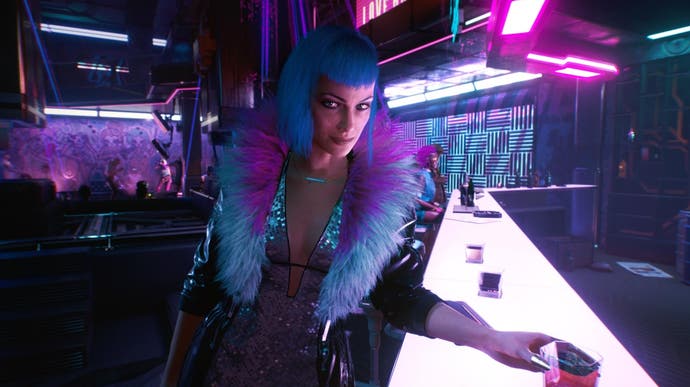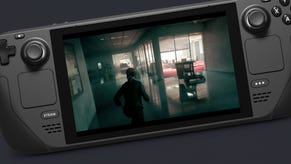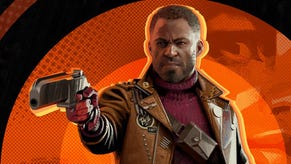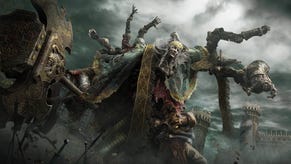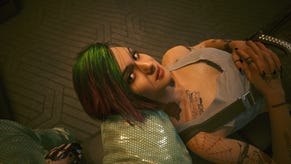Beyond the bombast and the bugs, Cyberpunk 2077 has a very human heart
Impressions of the first 40 hours ahead of our final review.
Editor's note: After years of hype and controversy, CD Projekt's Cyberpunk 2077 is arriving later this week. We've spent around 40 hours in Night City so far and will be delivering our final verdict later in the week. In addition to wanting to spend a bit more time with the game, the pre-launch build we have has some stability and performance issues, and we'd prefer to give CD Projekt a little more time to squash bugs and get the experience to the same level players will see later this week. Before the final review, here are our impressions of this vast and frequently impressive open world adventure.
If I were to sum up Cyberpunk 2077 quickly - and I'm not suggesting that's a very good idea - I'd say it is quite a bit smaller than you'd think. That sounds like a criticism, but it isn't. For all of Cyberpunk 2077's vastness - in the sheer height and width and length of it, in the sprawling, monolithic Night City, and in the noise it's made, the attention it's demanded ahead of launch - it is often quite surprisingly focused.
It's still early on for me, I should say - after 30 hours I was still, no doubt to the horror of many with vanishing spare time, just finding my feet - but much of that focus is placed on Cyberpunk's central story, which has so far been a welcome surprise. Beneath the noise - and Cyberpunk is truly cacophonous - there is a lingering thread of tenderness to it. I've opted to play V as a woman, with a 'Corpo' background, and she's been voiced impeccably by Cherami Leigh and written with some skill. There's real tenderness here, real vulnerability - a lot of "this city'll chew you up and spit you out" stuff, sure, but there's a waver to the tough talk, and from more than just V. Cyberpunk's story so far is one of fear, the surface of it plated in chrome and angst and body horror gore, but still built on a core of humanity. It's more than I expected, and more than we've been taught to expect, frankly, by the brashness of the marketing, the pitching of Night City as this great, submissive, ultra-hedonist playground. Night City is a vile swamp, in actual fact, and Cyberpunk's characters are drowning in it. It is, so far, more than just a synthwave skin on another puerile open world.
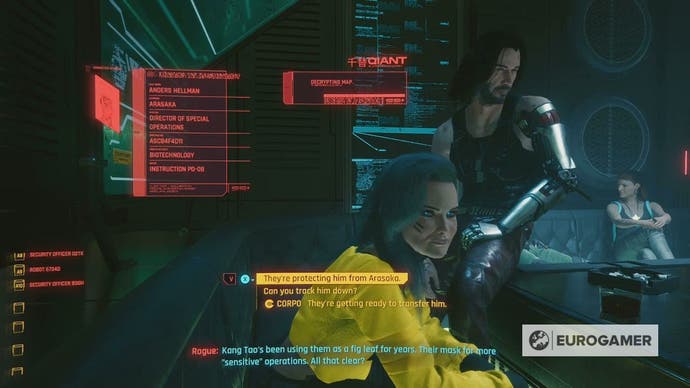
There is plenty of puerility, mind, and this has been the game's biggest tension. I don't need a penis length slider or areola settings, for instance. I don't understand the thought behind tying a character's gender to the sound of their voice, which seems a clumsy choice at the very best. And its relentless waves of shock-factor tone can be stifling. It's hard to maintain V's character as a human struggling for air - as she herself is written - as you eviscerate and decapitate your way through yet another enemy base, and just as hard to be horrified by whatever disemboweled soul you find at the end when you've done just as much along the way.
This is where Cyberpunk gets messy again, and where its objectives become less clear: does it want to be the back-alley techno pimp, the one that's proud of its vulgarity, out to sell you on the sordidness of the world, full of base and low-brow pleasures; or does it want to tell a story in that world, pitting you against it? After a few days with it I'm still holding out for the latter, but I'm still not entirely sure if I know - and still not sure if CD Projekt really does, either.
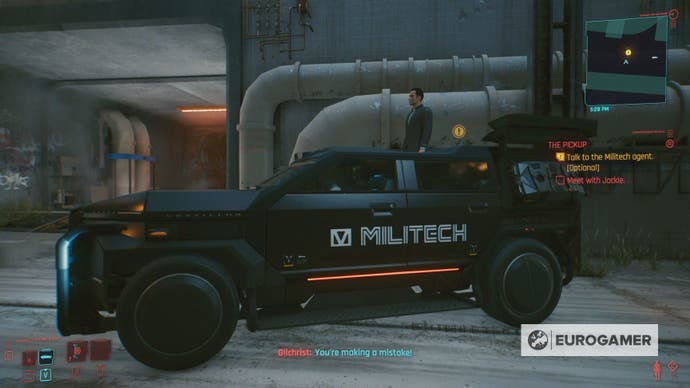
Cyberpunk's other great pitch to you is tied to that, in its persistent emphasis on immersion above all, and it's been striking to see how central a premise that is. CD Projekt's signature world-texture is present and correct, and there are some touching, curious sidequests - although nothing truly remarkable yet. The motion capture, when bug-free, is excellent, not just from Mr. Reeves. The proprietary lip-synching tech - again, when it isn't bugged out of existence - is actually more than a gimmick, granting gloss to the deeper conversations and life to Night City's otherwise shallow people. The sound design is hateful, honestly, but purposefully and exceptionally so and I love it for it, all buzzing flies, trickling blood, suffocating pain. Presentation, choice, and consequence are paramount.
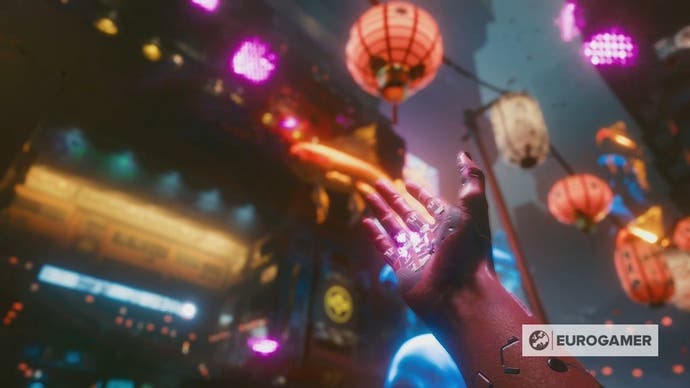
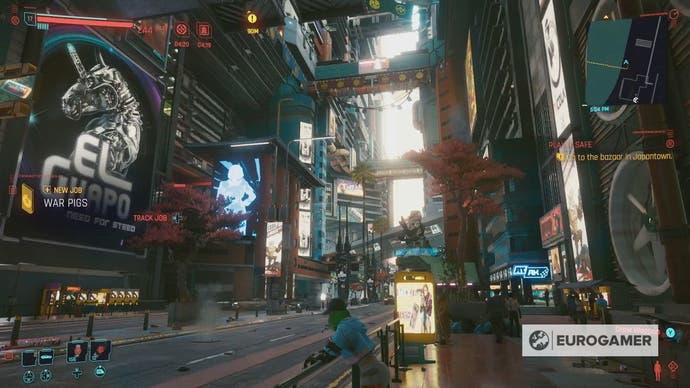
That is often to extraordinary benefit, but occasionally to a fault. In the story, situations have played out with quite dramatic differences depending on often unknown choices made. Someone else who's playing asked me if I knew how many ways there were to save a particular character in one mission, for instance. I was confused - in my game that mission's entire setup was based on them being dead. It makes for wonderful immersion, if you're just here to submit to the current and come along for the ride, but less so if you want a certain outcome or care to know the consequences of what you're about to decide. It's worth saying that here in the real world, there are more than three brief dialogue options that govern your decisions - there are limits to the realism a game can mine from only offering the blind type of choice.
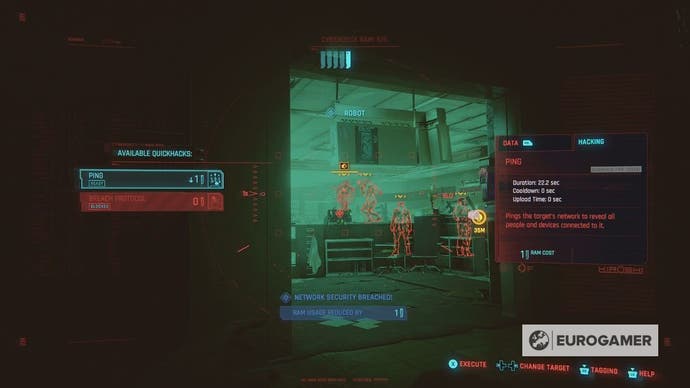
There are multiple approaches to more or less every mission, of course, and certainly every one with a chance of combat. It's far from a new concept - these kinds of missions feel especially close to Deus Ex territory, for instance - but what's impressive is how seamless Cyberpunk is, as you transition from one to the next. For me that's normally by accident - I am rubbish at stealth, but I do like trying it - but still, there's often more than just 'the stealth path' and 'the hacking option' to how a scenario plays out, and the chaos can be a blast.
That said, one thing Cyberpunk 2077 isn't is an immersive sim. At least not fully. The key to that specific pleasure is the way in which a world can be wound up like a toy car on an improvised track and then set in motion, relying on the specific type of trust you can build up in that world's particular physics and internal logic. In Cyberpunk things are slightly more rigid. The solutions are open - there are always options - but there aren't enough of those elaborate chain reactions possible from what's baked into its inner workings. There's much more for me to still unlock, mind - especially in the Intelligence skill tree, which governs your hacking skills and houses most of the more elaborate options for setting complex plans in motion - but that is one skill tree amongst five, and progress through them is slow.
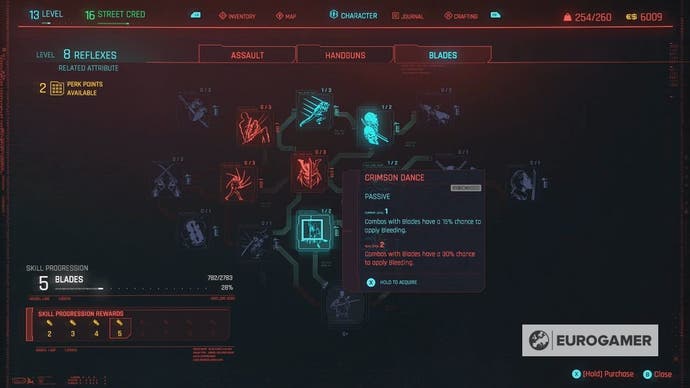
It's worth talking about that, too. One of the few things left out of the many demonstrations and previews from CD Projekt is a proper sense of how Cyberpunk 2077 actually flows, what your motivations are moment to moment, what your goals are as you progress, what you actually do. In brief, it's this: you gain XP from doing things, which feeds into a core group of attributes - Body, Reflexes, Tech, Cool, and Intelligence - and within those, two or three groups of perks, which are the actual skill trees. At the very beginning you'll assign a few points into each of those five attributes, and the higher level you are in those (say, Reflexes) the higher quality perks you can put points into in the related trees (say, a bleeding damage perk within the tree for Blades). This is all boring and technical of course but it's relevant, I hope, because it's probably the core system in the game, and it has consequences: you unlock attribute points to build your character however you like by just working through the game, completing missions, but you unlock most of the perk points, to hone and fine-tune your particular set of skills, by actually using those skills. There's a clever dance to it all, basically. You improve specific playstyles faster by playing with them (for Blades, that'd be by chopping people up, mostly), but choice is still there for you to mould things into another direction.
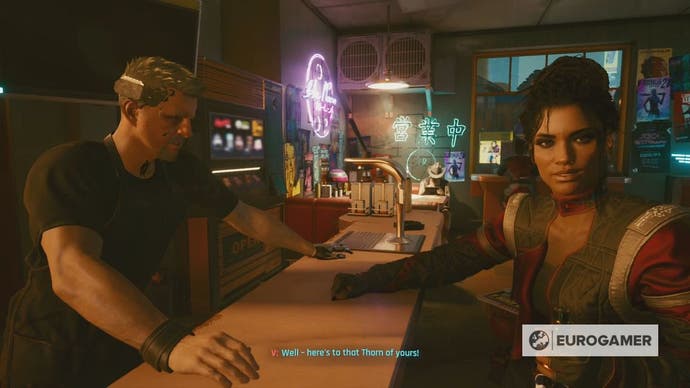
The biggest shame there, so far, is that so much is locked away so deep in the skill trees. The worry is that you'll get too far through the story to fully enjoy even a narrow, specialised slice of what Cyberpunk offers, let alone the whole thing. For now, combat feels limited. The guns are serviceable, and melee is fun in a slightly sickening way, but very simple - think The Elder Scrolls, but even simpler: a weapon in just the one hand. The sense is I'm a good way into Cyberpunk 2077 but still waiting for its systems to really open up.
Still, they might. And its story might settle into its promising rhythm, now it's gathering pace beyond the initial shock and awe. And Cyberpunk 2077 might also mature just a little more as a result. I'm hopeful, cautiously, of it all coming together. It'll be quite something if it does.
